When I first arrived in Athens nearly two decades ago, my greatest desire was to see the Acropolis. I had first visited it in 1974 when I was eight years old with my parents on my only trip to Greece before I came to live here on a permanent basis. After I had settled in at my relatives' house in Aspropirgos, I asked them for directions about how to get to the Acropolis. My aunt had no idea, as she never went into Athens herself, conducting all her business within the seven kilometres between Aspropirgos and Elefsina. My 20-year-old cousins didn't know either; the last time they went to see the Acropolis was when they were at school.
 |
One day, I took took one of those dirty blue buses myself - on my own; no one else was interested in going to see the Acropolis with me. Why would anyone be interested in a pile of rubble in one of Europe's most polluted cities? My aunt knew it was located on a hilly site. "Can you pick horta there?" she enquired. "Probably not," I answered. "Too much rock."
I had chosen a cloudy grey day in November, hoping that it would at least stay dry until the end of my trip. The morning peak traffic hour had passed, so that the bus could tear along at great speed, as if the driver had never seen such an empty stretch of road. I had a seat, but still had to hang onto the top of the seat in front of me to steady myself.
The route was one long boring stretch of concrete, flanked by a few low-lying hills which form the Athens basin. I was horrified by what I saw: gargantuan-sized gas works, steel works, cement works, oil distilleries, all found within metres of what looked like residential zones. Dust flew everywhere, piling on the side of the road like mud, especially outside the cement works. No one wore masks; no one seemed to care that they were inhaling dust. I wondered how my family managed to stay alive all those years of living here. Does dust not damage one's health, as my mother had raised me to believe? Maybe there isn't any need to constantly dust one's house; maybe once a year is enough.
As the bus approached the man-made Lake Koumoundourou, the scenery began to change slightly, with less industry and more bare hills on the left-hand side, while on the right-hand side I had a direct view of the sea which was filled with rusty ships. There was a small strip of land which looked like a beach area separating the coastline from the road and there were also a few signs advertising 'seaside' tavernas. The roaring traffic aside, this could otherwise have been a friendly looking place.


Not the prettiest sights on the Holy Road to Athens - isn't the sea supposed to be blue in Greece? The haphazardly placed signs outside the monastery mask its significance.
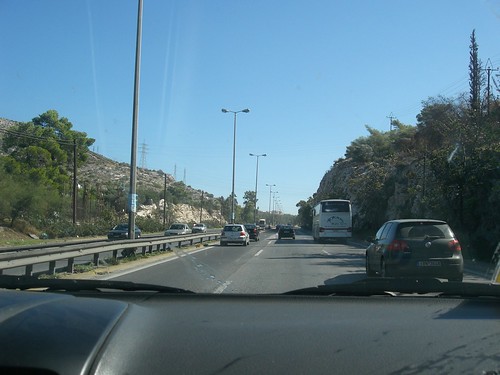
This pretty patch of forest stands deceptively like an oasis, smack bang in the middle of the up-built western suburbs of Athens and the horrendous industrial further westwards.
As the bus drove past the sea, I began to view evidence of a forested area, just beyond the 'lake district'. Pockets of houses had been built on some parts of the hill, making these areas look like picturesque Swiss villages, without the cows. The bus had now stopped at some traffic lights near a large junction. To my left was the mental hospital, a congregation of buildings erected in a purely functional style, while on my right, in total antithesis, were the remains of a former Byzantine monastery. The lights turned to green, and the bus driver careened out of control, rushing past the Western suburbs of Athens at lightning speed, braking hard at the bus stops to pick up or drop off passengers. Once or twice, he didn't even bother to stop when he was flagged down by a pedestrian waiting at a bus shelter. There were plenty of buses following him, going in pretty much the same direction.
After what seemed like a cartoon film strip showing the same scenes over and over again - light industry and shops surrounded by apartment blocks stretching up to the tops of the low-lying hills, one block after another - depicting the ritualised chaos that Athens serves up on a daily basis, I saw the mount of the Acropolis come into view. As the bus overtook a lorry, the view became clearer, and suddenly I saw the crumbling ruins of the Acropolis sitting at the top of the mountain. It was such a saddening sight to see it looking so lonely among the bad-taste high-rise buildings, all in different shades of filth, some brown, others grey, but most of them black. I was suddenly struck with awe as the history of the Acropolis over the ages passed through my mind. I thought of how she had been watching the wretched urban sprawl overtaking her environs for the last 2500 years and felt guilty for being a part of it. The marble edifice looked so out of place in the world as it had developed around her. I wanted to take her into my arms and cradle her, tell her how much I loved her and wanted to take care of her, that everything would turn out all right in the end, that the missing pieces from her frieze would come back and she would be intact once again. Then I felt foolish because I realised she was so much bigger than me. She wouldn't fit in my arms; I was making promises that could not be kept. What a fraud she must think I am.
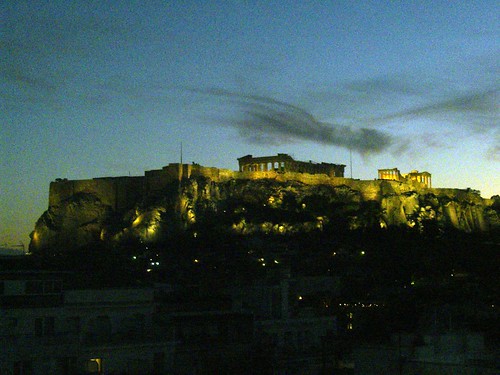
Boy, those Greeks cause so much trouble ,for the loss of ancient marble
From the site of Parthenona; you would think it was a mecca
Of some kind, but wait a minute - to get in you need a ticket
Of some kind, but wait a minute - to get in you need a ticket
To admire Greek works of art which will touch your soul and heart.
To see the Doric columns high rise above the clear blue sky
Like old stumps from olive trees. But what is missing? It's the frieze!
Yet still they stand proud on the hill where Paul preached goodwill to all,
Denuded of their jewel atop when Elgin heaved a mighty chop.
That man went to so much trouble to turn the frieze into mere rubble,
To gather and store the ancient stone so he could sell it off at home.
But no one wanted it for money, so he bequeathed it to the country
But no one wanted it for money, so he bequeathed it to the country
Who thought: "Good oh, now we have something that will look good with Egypt's mummy
And Chinese jade and Turkish weapons we chanced upon in foreign lands.
And Chinese jade and Turkish weapons we chanced upon in foreign lands.
But where to put them - let us build the best museum in the world!"
And so they started scrubbing white the marbles so they shone in light.
Alas! Too late they realised the marbles looked like dynamite
Had ruined their outer appearance and showed signs that they were to perish
And so they started scrubbing white the marbles so they shone in light.
Alas! Too late they realised the marbles looked like dynamite
Had ruined their outer appearance and showed signs that they were to perish
In that stately grand museum where all go if they want to see them.
And now those rabble-rousing Greeks insist on getting back those bits;
And now those rabble-rousing Greeks insist on getting back those bits;
They don't deserve to stand alone with all the rest of them at home.
They need to be in company with all the other bits of frieze
Under the clear blue sky of Greece - let's have them back! Return them, please!
(A little poem I wrote a while ago)They need to be in company with all the other bits of frieze
Under the clear blue sky of Greece - let's have them back! Return them, please!
I didn't go up to the Acropolis that day; I was too embarrassed to face the big rock. I waited for a day when I felt more at peace with myself, in the company of friends, on a sunny day, so that she wouldn't recognise me as the big-hearted ignoramus who broke her promise. She wouldn't notice me as I climbed up the smooth slippery steps; I would blend in with the crowds of visitors that had also come to see her and marvel at her beauty, basking under the Mediterranean sun under the clouds of smog that enveloped her.
*** *** ***
Have you heard the saying "Don't leave town till you see the country?" It was part of an advertising campaign in New Zealand during my youth, in a drive to get people to see more of New Zealand, instead of hopping off to the UK for their big OE (overseas experience) without having ventured through their own country first. I am just as guilty of this error in my judgment, having taken my children to the British museum on two separate visits to London to see the Parthenon marbles; you know the ones I mean - they were cut out, broken up and shopped away from Athens by a scoundrel that went by the title of Lord Elgin.When I saw the stolen (beg your pardon, but that's what they are) marbles in the British Museum for the first time, it was as a foreign-born Greek straight from Sheepland. I visited them in that 'oh-look-that's-Greek' way that most foreign-born Greeks view elements of Greekdom in a foreign country. I may as well have been saying 'baa-baa'. But the second time, after having lived in Greece for over a decade before my visit to the museum, and having seen the Parthenon from up close, the moment I saw those parts of the Parthenon frieze hanging on a wall in a dark room, my heart felt a piercing sting, as though I was seeing someone imprisoned under treacherous conditions. Where was the Mediterranean sun to shine over the marbles like it had been doing all those centuries before Elgin came along? Some of the pieces were still just pieces, whereas if they had stayed in Greece, they could have been re-built into the main structure of the reconstructed Parthenon.
My heart turned to stone, not because the British had damaged the marble by trying to scrape it white (in Greece, it would have turned black from the pollution anyway), but because the room where the marbles were kept had that semi-dark appearance, rendering it barren and lifeless, completely removed from the cultural heritage it belonged to. If someone visits Elgin's marbles and not the Parthenon itself, they will simply never understand the reason why the marbles should be returned to the original setting. But if they first visit the Parthenon and then see Elgin's marbles, they will realise what a heinous crime he committed against the Greek people 200 years ago, while he was acting as ambassador of England during the last few years of the Ottoman regime. He didn't even need to ask the Greeks themselves if he could 'take' anything - the governing powers at the time were against them in the first place.
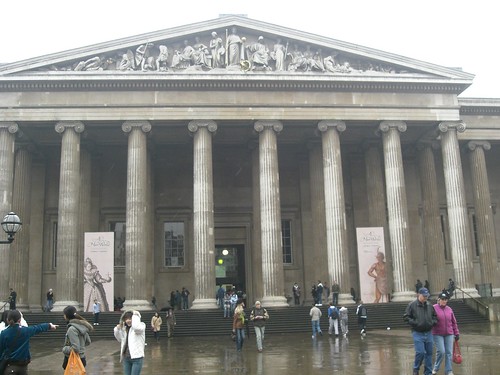
"Is this the Acropolis?" my son asked me when we visited the British Museum in London.
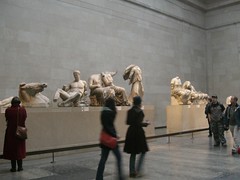
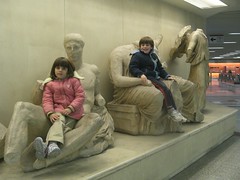
The genuine parts of the Parthenon frieze are in London... while the fakes are in the Acropolis metro station in Athens. Britain has the originals, while Greece has the phoneys.

Another shot from the metro station: compare this with the top left-hand one;
same figurines, different capital city.
When we visited the British Museum, we told the children that these marbles had come from the Acropolis. But since they had never been to the Acropolis, it meant very little to them. I realised that it was time to see for me to take them to see the original site before I took them to another foreign museum again.
I took the children out of school for two days to make this trip to Athens. When we arrived in the capital city, we discovered, to my great dismay, that the temporary employees at the Ministry of Culture had been blocking the entrance to the Parthenon, barring all visitors to the site, in protest at the loss of their jobs, working on a contract (rather than permanent) basis, and back-pay that they had not yet received. The day was cloudy and rain was forecast. I wasn't sure if the strike was over, so I decided not to make the trip, in case I disappointed them and the trip fell short of their expectations. We took a stroll on Ermou St, where all the famous brand-name clothes shops are located in the inner city. We could see the holy rock rising above the city skyline as we dodged the rain; there was no sign of life on it. Whether it was the strike or the rain, I shall never know.
Although Marks and Spencer has opened a store in Hania, the range of clothes is not as wide as in the Athenian branches. As a way to shelter from the cold (cold in Greece? you ask), we entered Marks and Spencer, more to browse rather than buy. Such a wide choice of goods, what to choose first? I found the street views more enticing than the high street fashion: a gypsy girl playing an accordion, a chestnut roaster, the human statue, the laterna player, the policemen (they seemed to be everywhere) and their motorbikes. Such is life in a big city...
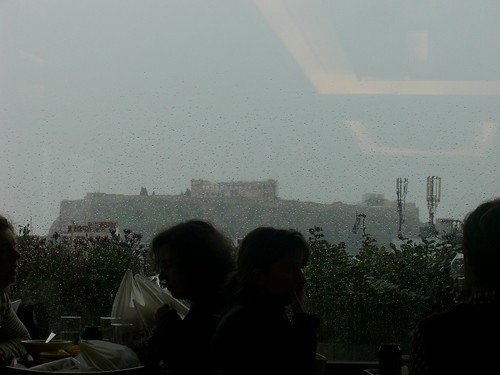
The Acropolis stands tall and proud, even in the rain.
I took this photo from the rooftop restaurant at the Hondos Centre.
It did end up raining after all. When we couldn't tolerate the drenching any longer, we nipped into the Hondos Centre at Omonoia Square where there is a rooftop restaurant serving good Greek food at low prices. While we looked around the dining hall to find a table, the children spotted the Acropolis from the window which was covered in droplets of rain. The downpour did not obscure our view of the holy rock. Even during the pouring rain, it stands astute, bearing witness to the devastation of the rat-race and urban development that has taken place around it, notwithstanding the cruel blows it has itself been dealt by the various incursions savaged on it, leading to its desecrated appearance today.
In this weather, the new open-top sightseeing buses in Athens aren't the best option.
"I'd like to go up there one day," my son said. "But not when it's raining."
"Good idea," I replied.
*** *** ***
©All Rights Reserved/Organically cooked. No part of this blog may be reproduced and/or copied by any means without prior consent from Maria Verivaki.
The Hondos Centre has a self-service restaurant which serves Greek snacks like tiropites (cheese pies), which my children ordered, and family meals such as biftekia and potatoes (my husband's choice) and artichokes in a lemon sauce (my choice).
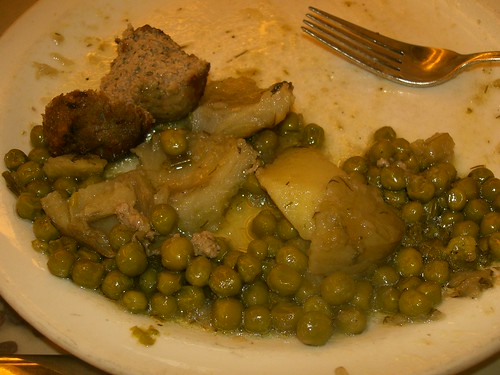

I had a bit of my husband's biftekia with my peas and artichokes; I can't imagine any child in Greece who hasn't been brought up to honour a good tiropita.
This meal is simple and light. It is best paired with cheese and some bread. It is perfect as a lenten meal, especially for the Holy Week before Easter; the peas and potatoes provide plenty of carbohydrates, while the dill and lemon juice give it its tangy flavour. Note that in Greece, artichoke hearts are not frozen with the stalks, nor with the leaves, but they can be used if the artichokes are tender enough. This meal can be made with either frozen or fresh artichoke hearts. Canned Italian-style artichokes (they are usually small and have some tender leaves stuck to them) are not suitable for this dish.
You need:
1/4 cup olive oil
1 large onion chopped chopped roughly
2-3 cloves of garlic (optional)
2 large potatoes chopped in large chunks
8 large artichoke hearts cut in halves
2 cups of peas
a small bunch of dill, finely chopped
the juice of 1-2 lemons
salt and pepper
Heat the oil in a pot and sauté the onion and garlic. Mix in the potatoes till they coated in oil. Add the artichokes, peas and seasonings and pour in just enough water to cover the vegetables. Place a lid on the pot and let the vegetables cook until the vegetables have softened. The potatoes may break up at this point, so be gentle when stirring. Now add the dill and lemon juice, stirring them evenly into the pot. The broken potatoes will act as a sauce thickener. Cook for another 5-10 minutes and serve hot.

I made this dish as soon as we got back from our trip. My artichokes look a rather dull brown colour; this is because they are from last year's garden, and I froze them at the end of their season. Commercially frozen ones are usually whiter (they are processed in some way).
This dish is made in the style of artichokes a la polita. Carrots, spring onions and leeks can also be added or used to replace another vegetable that you may not have on hand. This meal can also be made using tomato juice (add it to the pot instead of water, and don't use lemon); while we were in Athens, one of our cousins served us freshly-made soutzoukakia-style meatballs in tomato sauce, into which she had added commercially frozen artichoke hearts.
At the roof garden restaurant at the Hondos Centre in Omonoia Square, we ordered two tiropites, a serving of artichokes and peas, a serving of roast potatoes and biftekia, 2 sodas and 2 beers. Total cost: 25 euros.
It's the start of the Holy Week today in the Greek Orthodox church. With this kind of meal, you won't even realise you are fasting.
This post is for you, Sifi.


I had a bit of my husband's biftekia with my peas and artichokes; I can't imagine any child in Greece who hasn't been brought up to honour a good tiropita.
This meal is simple and light. It is best paired with cheese and some bread. It is perfect as a lenten meal, especially for the Holy Week before Easter; the peas and potatoes provide plenty of carbohydrates, while the dill and lemon juice give it its tangy flavour. Note that in Greece, artichoke hearts are not frozen with the stalks, nor with the leaves, but they can be used if the artichokes are tender enough. This meal can be made with either frozen or fresh artichoke hearts. Canned Italian-style artichokes (they are usually small and have some tender leaves stuck to them) are not suitable for this dish.
You need:
1/4 cup olive oil
1 large onion chopped chopped roughly
2-3 cloves of garlic (optional)
2 large potatoes chopped in large chunks
8 large artichoke hearts cut in halves
2 cups of peas
a small bunch of dill, finely chopped
the juice of 1-2 lemons
salt and pepper
Heat the oil in a pot and sauté the onion and garlic. Mix in the potatoes till they coated in oil. Add the artichokes, peas and seasonings and pour in just enough water to cover the vegetables. Place a lid on the pot and let the vegetables cook until the vegetables have softened. The potatoes may break up at this point, so be gentle when stirring. Now add the dill and lemon juice, stirring them evenly into the pot. The broken potatoes will act as a sauce thickener. Cook for another 5-10 minutes and serve hot.

I made this dish as soon as we got back from our trip. My artichokes look a rather dull brown colour; this is because they are from last year's garden, and I froze them at the end of their season. Commercially frozen ones are usually whiter (they are processed in some way).
This dish is made in the style of artichokes a la polita. Carrots, spring onions and leeks can also be added or used to replace another vegetable that you may not have on hand. This meal can also be made using tomato juice (add it to the pot instead of water, and don't use lemon); while we were in Athens, one of our cousins served us freshly-made soutzoukakia-style meatballs in tomato sauce, into which she had added commercially frozen artichoke hearts.
At the roof garden restaurant at the Hondos Centre in Omonoia Square, we ordered two tiropites, a serving of artichokes and peas, a serving of roast potatoes and biftekia, 2 sodas and 2 beers. Total cost: 25 euros.
It's the start of the Holy Week today in the Greek Orthodox church. With this kind of meal, you won't even realise you are fasting.
This post is for you, Sifi.
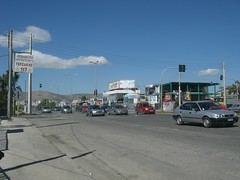
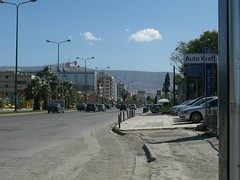
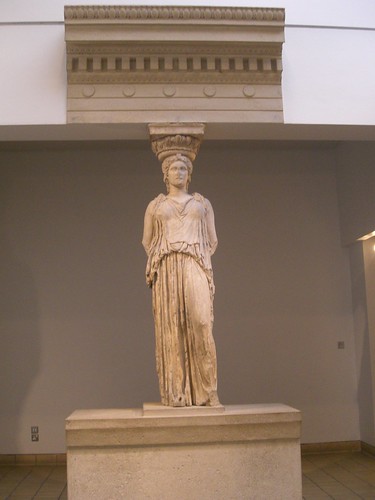
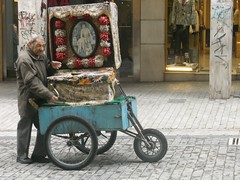
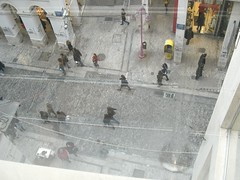
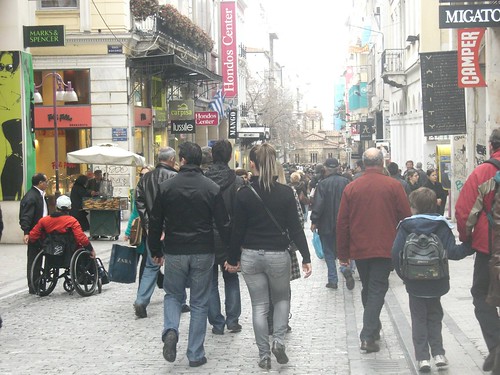
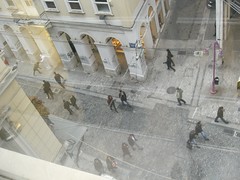
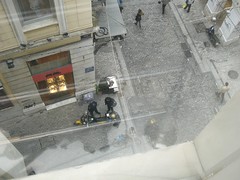
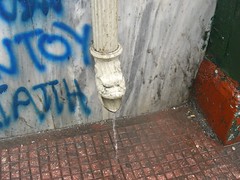

What a nice trip. It's too bad that you weren't able to go up to the Acropolis on this trip, but you can always return. I haven't been there in 19 yrs, although I've been to Athens a few times since my first visit.
ReplyDeleteI love artichokes and this recipe looks fantastic!
once again you made my night so much better with your post and the photos, specially the photo of the old man that was playing the Laterna, i honestly thought that they are extinct after all the years, i also want to wish you and all your family a Happy Easter, thank you Leonard from OZ.
ReplyDeleteMaria,
ReplyDeleteI liked at the beginning your aunt asked you if you could pick horta there!! You were very adventurous to go off by yourself to find it!
I wish I had gone to Greece with my girlfriends when they went on a two month long journey "around the world" while traveling back to the US from Korea. They spent a good amount of the time in Greece. I might have seen Athens about the same time you did, if I had. Glad I'm "seeing" it now, through you.
The meal looked delicious too (both!). It is hard to believe you are fasting! Wonderful.
I was struck with the photos of the Parthenon when you were a child. No way can you get that close to the ruins in this day and age (which is understandable).
ReplyDeleteThose photos are beautiful! Making me want to start booking tickets right now.
ReplyDeleteThank you, thank you for getting in touch. Happy to report Wellington has produced wonderful weather over our Easter (I do keep misspelling it as Eatser).
ReplyDeleteI hope you get at least as good for Holy Week and the Easter celebrations. Fasting on potatoes and artichokes? Yes, I know what the food to avoid are.
I agree that the marbles were stolen! Classical studies was available for the 2nd year running when i was in the sixth form. Became my favourite subject. Even did some at university before I pulled out.
Hope your week is happy, sending care to you and thanks for gettting in touch, Michelle/Mickle and my soundly sleeping Zebbycat.
Yes, Michelle in Wgtn again.
ReplyDeleteJust reading your 2nd post on visiting Athens - I have a copy of the "Favourite Greek Recipes" cook book put together by the women of the Wgtn Greek Community. My version is the 1994 update they did 10 years after the original publication in 1984.I even gave my dad a copy.
No, i'm not Greek, but love cooking and love many Greek foods.
My cat is snoring, I'd best join him in beddybise.
Michelle/Mickle in Wellington. xxx from here!
This is a great post which has of course your signature, well known to us!!
ReplyDeleteThanks for the Athens postcard and the anginares dish (that's mine tomorrow). I too first visited Greece in '74.
ReplyDeleteWow what a great post! I love the acropolis and have also seen the Elgin marbles in London and really believe they should be back in their home on the hill in Athens. They just don't make sense out of context! I lived in Athens for a year working at the Athenian Agora. I was so lucky, under the shadow of the Parthenon every day. It was a dream. I really grew to appreciate that city, and learned to see beyond first impressions of pollution and modern chaos.
ReplyDeleteMaria, what a wonderful post! I love your pictures and descriptions as they make me feel like I'm almost there. Actually, when I was 22 and not married( back in 1974),I was in Athens with a tour and I visited the Acropolis! It is one of my fondest memories as it is such an awe inspiring place. We were only 2 days in Athens, with a short visit to Crete, but if I could go anywhere in this world, I'd want to visit Greece again, only for a more extended time! We had a very "interesting and lively" taxi ride while there!
ReplyDeleteWe celebrated Easter this past Sunday. We had many visitors at church and came home to a meal that included ham, potatoes, vegetables, rolls, and a fruit dessert.I wish you a Blessed Holy week and Easter!
Lovely post Maria - thoroughly enjoyed it. It would have been nice to catch up while u were in Athens. Kali Anastasi to all of you and maybe see you in the summer!
ReplyDeletePS Fully identify with the feelings re the Parthenon Marbles, that's why I've included the initiative/push by Alexis Mantheakis on the Global Greek World Blog - it is really about time they came back, doing it the nice way seems to have failed to appeal to teh Brits sense of justice, let's see what the not so nice does...
ReplyDeleteThank you for a wonderful post! I hope to visit Greece some day and walk amidst the Parthenon but it is so important for all of us to understand what has been done and what is happening to this extraordinary site.
ReplyDeleteHave you read the book "Stealing Athena," by Karen Essex? A great book dealing with the Elgin/Parthenon Marbles (from POV of Lady Elgin) and also a look back into the history of the erection of the temple... a bold look at women in history. The author is a friend of mine, but the book is an unqualified success story, even if you don't know her. I loved reading this post of yours, and I'm SO glad you're blogging again!
ReplyDeleteTrailing along with you through the streets of my favorite city is pure joy.
ReplyDelete